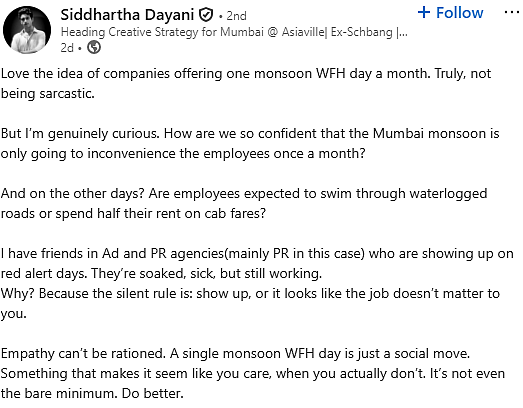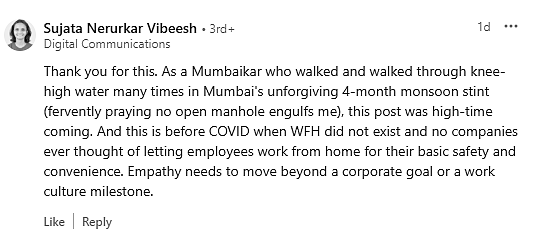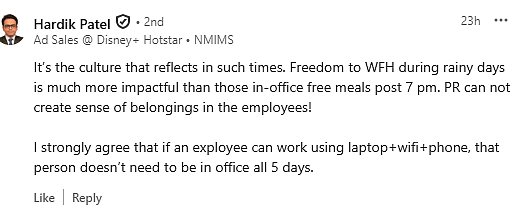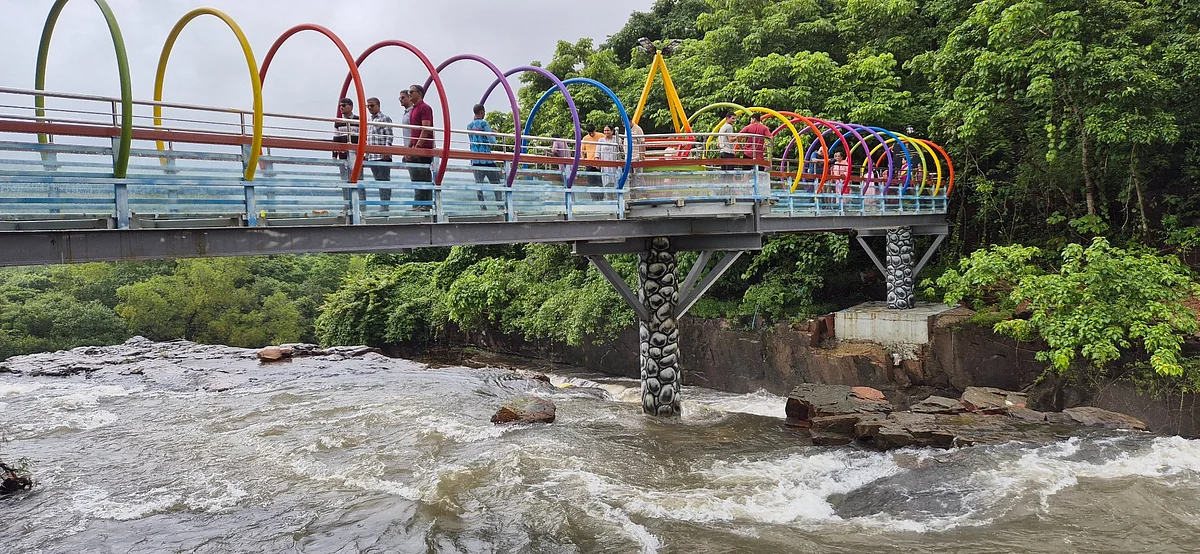A LinkedIn post by Siddhartha Dayani, a marketing executive, has gone viral for calling out companies offering just one work-from-home (WFH) day during Mumbai’s monsoon season. His sharp critique has ignited a wider conversation around corporate apathy, performative policies, and the real challenges employees face during extreme weather.
‘One WFH Day for the whole monsoon? Really?’
In his post, Dayani sarcastically praised the concept of a single monthly monsoon WFH day, questioning the logic behind such a limited gesture. “How are we so confident that the Mumbai monsoon is only going to inconvenience the employees once a month?” he asked, pointing out the unpredictability and intensity of rains in the city.
The comment, posted on Tuesday, struck a nerve with many professionals who echoed his frustration. He further questioned whether companies expect employees to wade through waterlogged roads or spend exorbitantly on transport on days they aren’t allowed to work remotely.

Mumbai monsoon: Notoriously unpredictable
The India Meteorological Department (IMD) has issued an orange alert for Mumbai on Thursday, warning of heavy rainfall and waterlogging. As per latest data, the city’s lake water levels have reached 85.32% capacity, signalling the peak of the monsoon.
The rains in Mumbai often lead to widespread disruption: suspended trains, delayed flights, and flooded streets. Yet, many companies continue to mandate office attendance, offering conditional or minimal flexibility, such as one monsoon WFH day, a gesture now being widely criticised as insufficient.
Monsoon realities vs corporate optics
Dayani mentioned that several of his friends in the advertising and public relations industry are still required to attend office, even on IMD-issued red alert days. According to him, the silent but dangerous narrative remains: “If you don’t show up, it looks like your job isn’t important to you.”
He slammed such policies as mere corporate tokenism. “This isn’t even the bare minimum. It’s just something to make it look like companies care,” he wrote, calling for more thoughtful and compassionate action during the monsoon.
Massive support from professionals online
The post resonated widely, attracting hundreds of likes and supportive comments on LinkedIn. Many users praised Dayani for articulating a concern that is often brushed under the carpet. One user quipped, “It’s like giving someone one tissue in a hurricane and saying: ‘Stay dry, champ’.” Another added, “Hitting a little too close to home today.”
Others chimed in to highlight similar woes in other cities. A user from Gurugram noted how even posh corporate zones in NCR get flooded regularly, yet employees are still expected to clock in physically.

Time for companies to reassess hybrid norms?
Post-pandemic, hybrid work has become the norm for many sectors. Yet, as Dayani’s post highlights, some companies are rolling back flexibility in the name of "return to normal", even when normal includes city-wide chaos during the monsoon.
The growing support for Dayani’s post suggests that professionals are no longer staying silent about performative corporate behaviour. Many are now urging companies to re-evaluate policies based on real-world challenges, not boardroom optics.

Daily commutes questioned in a hybrid world
Many users chimed in with similar frustrations, pointing out that modern workflows rarely require employees to be in the office daily. “Why commute for hours just to attend virtual meetings on Microsoft Teams?” asked one commenter. Others emphasised that physical office visits should be limited to once a month unless absolutely necessary.
This discussion highlights a growing mismatch between technological capabilities and traditional corporate expectations. With virtual collaboration tools now mainstream, critics question the rationale behind rigid office attendance policies.

The hidden cost: mental and physical fatigue
Beyond lost time, several users raised concerns about the toll daily commutes take on health and productivity. “Two hours in traffic isn’t just a time issue, it’s mentally exhausting. Air quality is poor, and public transport is overcrowded,” wrote one user. Others highlighted that working from home enables short breaks and power naps, which can actually improve focus and overall output.

Flexibility: The key to the future of work?
As companies attempt to strike a balance between collaboration and convenience, many professionals are advocating for more empathy-driven policies, especially in cities where commuting is a daily battle.
Experts suggest that a hybrid approach, with optional office visits, may offer the best of both worlds. After all, as the post’s author suggests, “Why waste your energy getting to the office, when that energy could be used to actually work?”










